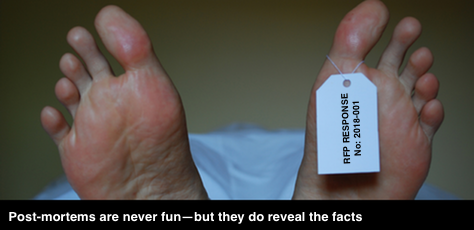Proposal evaluators can usually find ways to adjust the technical score in favour of a preferred candidate to offset small price disadvantages. That means bids lost by a few percentage points—say, less than five—were likely winnable.
This is why it’s essential to review every lost bid.
Get both internal and client perspectives
Some bidders take the opportunity to receive feedback from the RFP issuer, but do not meet as a team to decide whether and how to improve internal processes.
Both exercises are valuable and can benefit from external expertise.
What we recommend
Take advantage of both issuer feedback and internal post-mortems. Budget for, conduct and document a formal post-mortem when you’re unsuccessful on any large bid. Structure your reviews using these steps:
- Recruit an independent third party to lead the evaluation
- Consider using Freedom of Information (FOI) requests to get copies of the winning bid and any close runners-up*
- Interview individuals (directly, or using a third party) in the prospect organization
- Get input from your bid team members, subject matter experts and relationship managers
- Summarize findings in a lessons-learned document with specific improvement recommendations
- Facilitate conversations with your team and other stakeholders to review the findings
- Develop a plan and assign individuals to implement agreed-on improvements
- Follow up to ensure completion
* FOI requests can take months to process, so don’t postpone your internal review waiting for FOI results. Also, some issuers will offer a debriefing in exchange for a waiver of the right to pursue an FOI request. Debriefs are faster and cheaper but, to avoid making a bad bargain, negotiate the information to be provided before agreeing to this deal.
Dealing with resistance
Teams often resist win-loss reviews. Avoidance closes the door quickly on an embarrassing, even painful, experience. The counter argument is that doing the work to understand a loss is the only way to know what to do differently the next time.
Individual team members may claim they already know why the effort fell short. If so, a formal review is an opportunity to reach shared agreement on needed improvements. Documenting what happened and what needs to change also builds wider support for changes to processes and behaviours.
Conduct a post-mortem even when you win
Bid wins are usually greeted with high-fives—followed immediately by the realization there’s lots to do to mobilize the new opportunity. In many companies, bid team members are also on the front line in gearing up for the new work. A post mortem is not a high priority.
It’s also easy to assume you know what you did right. But even when you win it makes sense to compare the runner-up proposals, ask your customer what was most (and least) compelling about your bid, and then compare what you learn with your team’s assumptions.
Knowing the facts will help you do more of what you did well next time.


